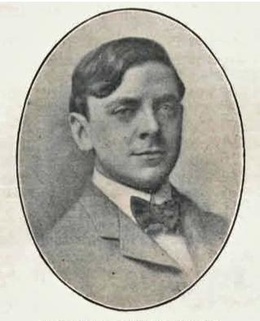Nathaniel Davis Ayer, usually billed as Nat D. Ayer, was an American composer, pianist, singer and actor. He made most of his career composing and performing in England in Edwardian musical comedy and revue. He also contributed songs to Broadway shows, including some of the Ziegfeld Follies.

The "Maple Leaf Rag" is an early ragtime musical composition for piano composed by Scott Joplin. It was one of Joplin's early works, and became the model for ragtime compositions by subsequent composers. It is one of the most famous of all ragtime pieces. As a result Joplin was called the "King of Ragtime". The piece gave Joplin a steady if unspectacular income for the rest of his life.
Percy Wenrich was a United States composer of ragtime and popular music.

Martinus Sieveking was a Dutch virtuoso pianist, composer, teacher and inventor born in Amsterdam. Also known as Martin Sieveking, he performed as a soloist around Europe and the United States during his active career and taught in France and the U.S. after he retired from performing. He is sometimes known as The Flying Dutchman, coming from the Netherlands and for his volatile disposition. At the peak of his career, he was pronounced by the New York and Boston critics as one of the quartet of the greatest living pianists of that time, together with Ignace Paderewski, Moriz Rosenthal and Rafael Joseffy.
Louis Achille Hirsch, also known as Louis A. Hirsch and Lou Hirsch, was a popular composer of songs and musicals in the early 20th century.

George Linus Cobb composed over 200 pieces of music, including ragtimes, marches, and waltzes. He also wrote columns for music trade publications.
Oreste Migliaccio (1882–1973) was a jazz pianist, composer and prominent band leader. His band Oreste and his Queensland Orchestra were popular in the 1920s and 1930s.
Felix Fox was a German-born concert pianist and educator.
The Boston Almanac was an almanac and business directory in 19th century Boston, Massachusetts. Its offices were destroyed in the Great Boston Fire of 1872. The first almanac was published in 1836, and continued annually until at least 1894. Just about all editions contained a chronology of major events in Boston for the previous year or two years. Each almanac contained business listings, advertisements, and often city and/or state department information. Railroad, omnibus, and horse car companies were usually listed in a separate section. Some volumes highlighted famous buildings or places.
Miss 1917 is a musical revue with a book by Guy Bolton and P. G. Wodehouse, music by Victor Herbert, Jerome Kern and others, and lyrics by Harry B. Smith, Otto Harbach, Henry Blossom and others. Made up of a string of vignettes, the show features songs from such musicals as The Wizard of Oz, Three Twins, Babes in Toyland, Ziegfeld Follies and The Belle of New York.
Billy Lang(néWilliam August Leng; 28 May 1883 in Boston – 23 December 1944 in San Francisco) was a lyricist and music publisher active in Boston from 1910 to 1930.
Robert Levenson was a lyricist active in Boston in the late 1910s.
Vincent Charles Plunkett was an American composer and illustrator of popular songs active in Boston and Los Angeles between 1915 and 1925.
Oliver E. (“Chick”) Story was a composer, publisher, and performer active in Boston from 1910 to 1925.
Wallie Herzer(néWalter Henry Herzer; 15 April 1885 San Francisco – 15 October 1961 Redwood City, California) was an American composer of popular music, music publisher, and pianist. Herzer flourished in music prior to and during World War I. The Columbia recording of his 1912 composition, "Everybody Two-Step" — performed by ragtime pianist Mike Bernard on December 2, 1912, in New York City — is the first recording of ragtime music. It became a hit and coincided at the start of a renewed craze for ragtime and dance — fifteen years after William Krell's "Mississippi Rag" had been published, the first known published music with "rag" in the title. Several other recordings of "Everybody Two-Step" became hits. Herzer composed three other hits — a 1913 piano rag, "Tickle the Ivories" – which also became hit as a vocal arrangement; a 1914 foxtrot song, "Get Over, Sal"; and a 1916 Hawaiian waltz song, "Aloha Land". Other compositions — including his 1908 piano ragtime two-step and barn dance, "The Rah-Rah Boy", and his 1913 rag turkey trot, "Let's Dance" — were internationally distributed.

Addison Burkhardt was a librettist and lyricist from about 1903 to 1922 and a Hollywood script and scenario writer thereafter.

Fred Hylands was an American pianist, composer and publisher active 1887-1913.








